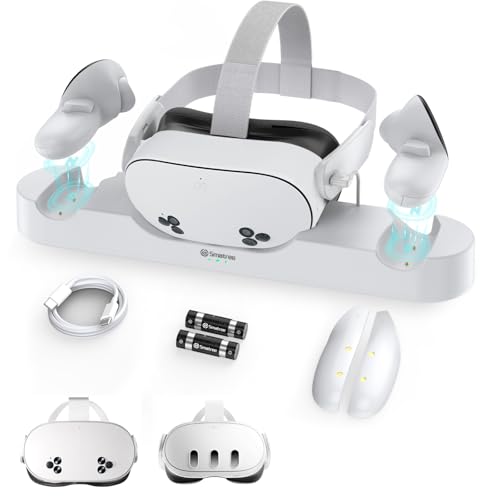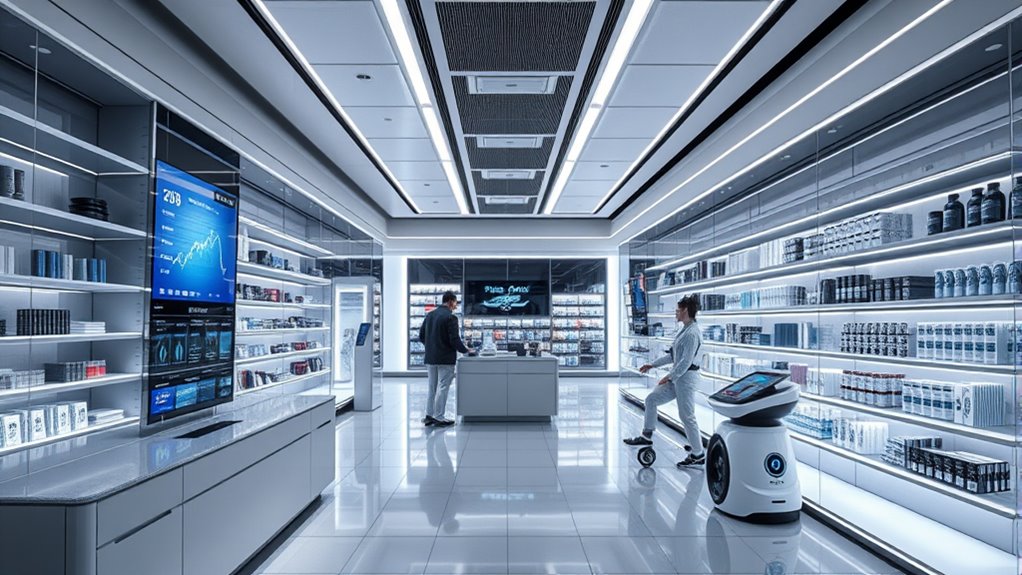AI is making stores think like Silicon Valley startups by embedding innovation, agility, and data-driven decision making into everyday operations. It helps personalize experiences, predict customer demand, and optimize inventory, much like a tech startup’s focus on rapid iteration and disruption. Retailers are investing heavily in AI to boost sales and improve efficiency, creating a culture of continuous innovation. If you keep exploring, you’ll discover how these changes are reshaping the future of retail.
Key Takeaways
- AI enables stores to operate with a startup mindset by fostering innovation, agility, and rapid decision-making.
- Retailers leverage AI for hyper-personalization, similar to Silicon Valley’s focus on user-centric experiences.
- Advanced analytics driven by AI help stores predict customer needs and optimize inventory dynamically.
- AI automates backend processes, increasing efficiency and allowing stores to adapt quickly to market changes.
- Investment in AI reflects a cultural shift toward data-driven innovation, mirroring startups’ emphasis on technological advancement.

Artificial intelligence is transforming retail from a traditional industry into a hub of innovation akin to Silicon Valley startups. You’re no longer dealing with simple tools like chatbots or basic recommendation engines. Instead, AI is deeply embedded in how stores operate and serve customers, making them more agile, personalized, and competitive. Hyper-personalization driven by AI now meets rising consumer expectations, giving retailers a sharp edge over competitors. With AI, you can predict customer demands, optimize inventory, and strengthen supply chains, all while making smarter, data-backed decisions. This shift isn’t just a trend; it’s becoming essential. Top retailers allocate up to 20% of their tech budgets to AI, reflecting their confidence that these investments will boost sales and streamline operations.
Most retail leaders recognize AI’s value: about 85% have developed AI capabilities, and 60% are actively expanding their investments. Over half plan to increase their AI budgets further in the coming years, signaling a commitment to stay ahead. In fact, AI spending jumped from 15% to 20% of tech budgets between 2024 and 2025, showing how fast confidence in this tech is growing. During Black Friday 2024, AI-driven chatbots helped retailers increase conversion rates by 15%, proving AI’s direct impact on sales. AI adoption is accelerating rapidly across the industry, making it a critical component of modern retail strategies. Additionally, integrating advanced analytics enables retailers to better understand customer behavior and tailor their marketing efforts more effectively.
Most retail leaders now prioritize AI investments, with over half planning further budget increases to stay competitive.
Your customers now trust AI-powered recommendations just as much as popular social media influencers. They rely on AI for practical tasks like price comparisons, shipping info, and alerts about deals or stock updates. Speed and simplicity are vital—69% of shoppers want fast, frictionless experiences, and AI helps deliver just that. It creates seamless, personalized journeys that feel like having a trusted shopping assistant by your side.
AI also transforms supply chains by predicting disruptions before they happen, reducing overstocking by roughly 18%, lowering waste and costs. Retailers use AI to automate backend processes, balancing efficiency with excellent customer service. Demand forecasting and dynamic inventory adjustments driven by AI mean stores can respond rapidly to market changes, making their operations more adaptable. This approach pushes retail firms to adopt a startup mentality—innovative, data-driven, and ready to adapt—just like Silicon Valley startups.

VIYISI Battery Pack for Oculus Quest 2, 5000mAh Portable Charger Accessories for Meta Quest 2 Headset, Power Bank for VR Quest 2 Original Strap, Fast Charging Extend Extra 2-4H Playtime
[Exclusive Slide-In Design] - The VIYISI battery pack features a unique slide-in design that integrates seamlessly with the...
As an affiliate, we earn on qualifying purchases.
Frequently Asked Questions
How Does AI Improve Customer Personalization in Retail?
AI improves customer personalization in retail by analyzing real-time data to tailor product recommendations and marketing messages specifically to you. It understands your preferences through natural language processing and behavior tracking, adjusting offers instantly. This creates a seamless, relevant shopping experience, boosting your satisfaction and loyalty. With AI, retailers can anticipate your needs, deliver personalized content, and increase engagement, making your shopping more enjoyable and efficient.
What Are the Biggest Challenges for Stores Adopting AI?
You face significant challenges when adopting AI, including high costs for infrastructure and ongoing investments, which strain your budget. Integrating AI with legacy systems proves difficult, creating data silos and unreliable insights. You also worry about compliance, ethical concerns, and maintaining customer trust. Additionally, a lack of expertise and cultural resistance can slow adoption, making it tough to fully leverage AI’s benefits without proper training and organizational change.
How Cost-Effective Is AI Implementation for Small Retailers?
AI implementation can be cost-effective for small retailers if you start small and choose affordable, off-the-shelf solutions. You’ll want to leverage cloud-based services to avoid hefty upfront investments and focus on automation tools like chatbots or inventory management. While costs can add up over time, many find the efficiency gains and potential sales boosts worth the investment. Just remember, it’s not a silver bullet, so plan carefully and stay within your budget.
What Ethical Concerns Arise From AI in Shopping Experiences?
You should be aware that AI in shopping raises ethical concerns like privacy breaches, algorithmic bias, and lack of transparency. Customers may distrust how their data is used, especially with frictionless checkouts and personalized recommendations. Bias in AI can lead to unfair treatment, while hidden algorithms erode trust. Plus, AI-generated imagery and targeted ads might manipulate or mislead consumers, impacting brand integrity and consumer well-being.
How Will AI Influence Future Retail Employment?
AI will profoundly reshape retail employment, with around 13.7% of U.S. workers losing jobs to automation since early 2025. You’ll see routine roles replaced, especially in customer service and sales, but new opportunities will emerge in tech support, AI maintenance, and data analysis. If you adapt by learning digital skills, you can stay relevant. Retail jobs emphasizing human interaction and decision-making will evolve rather than disappear entirely.

Charging Dock for Meta Quest 3S/3, Kinwin Magnetic Charging Station for Oculus Quest 3S/3 Accessories with RGB Light, Charging Stand for VR Headset and Controller for Sony PSP Accessory Kits (White)
Charging Headset & 2 Controllers Simultaneously: Kinwin charging station for meta quest 3s/3 allows you to charge your...
As an affiliate, we earn on qualifying purchases.
Conclusion
Just like a startup enthusiastic to innovate, stores embracing AI are transforming their mindset to be more agile and customer-focused. You’re no longer just a brick-and-mortar; you’re a data-driven, tech-savvy hub that adapts quickly. AI pushes you to think like a Silicon Valley startup—always experimenting, learning, and evolving. It’s as if you’re planting seeds of innovation in every corner, turning your store into a dynamic ecosystem that thrives on change and creativity.

Smatree Charging Dock Compatible for Meta Quest 3S/Quest 3,Charge Controllers and Headset Simultaneously, VR Charging Station with LED Light, with 2 Rechargeable Controller Batteries(NO Adapter)
2.5H Fast Charging: The Smatree Charging Dock can fully charge your Quest 3S/Quest 3 headset and touch controllers...
As an affiliate, we earn on qualifying purchases.

Hurra Charging Dock for Meta Quest 2, VR Charging Station for Oculus Quest 2 Support LED Indicator/Magnetic Charging Headset & Touch Controllers, with 2 Rechargeable Batteries, USB-C Charger & Cable
Fast Charging for Quest 2 & 2 Controllers: This magnetic rechargeable charging dock is designed for elite gamers....
As an affiliate, we earn on qualifying purchases.










